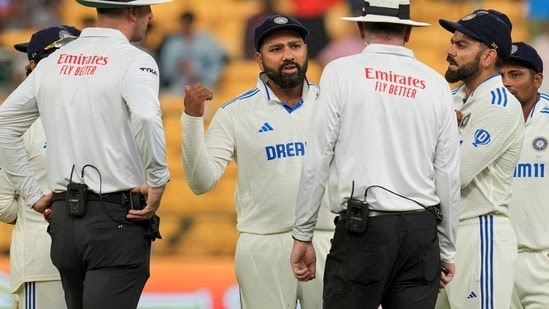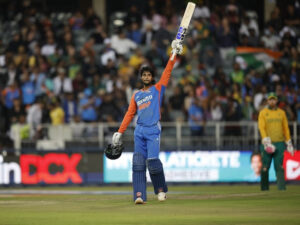
Ian Smith Baffled, Questions Rohit Sharma’s Motive on-Air After Indian Captain Argues With Umpire on Bad Light Stoppage
In a surprising twist during a recent cricket match, Indian captain Rohit Sharma found himself at the center of controversy after an on-field argument with the umpires over a bad light stoppage. The incident took an unexpected turn when veteran cricket commentator Ian Smith publicly questioned Rohit’s motives during the live broadcast, leaving fans divided and sparking debates across the cricketing world.
The scenario unfolded as the Indian team was chasing a tricky target in the final overs of the match. With the tension mounting and the game hanging in the balance, the umpires decided to stop play due to deteriorating light conditions, citing concerns over player safety. While the umpires’ decision was in line with the laws of the game, Rohit’s reaction raised eyebrows. He was visibly frustrated and was seen engaging in a heated discussion with the on-field officials, contesting their decision to halt the proceedings.
Ian Smith, known for his sharp cricketing insights, was quick to express his disbelief on air. “What is Rohit trying to achieve here?” Smith asked, his tone laced with both confusion and frustration. “The umpires are responsible for the safety of the players. Arguing with them, especially over something as clear as bad light, doesn’t make any sense. Is Rohit forgetting that the laws apply to both sides equally?”
Smith’s comments ignited an immediate storm of reactions, especially among Indian cricket fans, many of whom felt that the New Zealand commentator was being overly harsh. However, Smith didn’t stop there. He went on to question whether Sharma’s actions were motivated by gamesmanship rather than genuine concern. “Is he trying to pressure the umpires to favor his side? Is this a tactic to disrupt the opposition’s momentum?” Smith continued, casting doubts on the Indian skipper’s intent.
To some, Rohit’s frustration seemed understandable. After all, India was in a strong position, and any delay in the game could potentially have changed the match’s outcome, especially if poor weather led to a reduction in overs or forced a premature end. But to others, the Indian captain’s behavior appeared unnecessary, even reckless, considering the strict rules around bad light.
The larger question remains: did Rohit Sharma cross a line? Bad light is one of the most contentious issues in cricket, but the laws are clear—player safety comes first. By confronting the umpires so publicly, Rohit may have inadvertently put his reputation on the line. Smith’s baffled reaction, while blunt, echoed a sentiment that’s been growing: top cricketers, no matter their stature, must respect the decision-making process on the field.
Smith’s critique also touched on a broader theme within modern cricket—how much influence should captains exert on the umpires? Captains, particularly of top-tier teams, are often seen trying to negotiate decisions that don’t go their way. However, when the issue at hand is something as non-negotiable as bad light, it raises the uncomfortable possibility that some players feel entitled to bend the game’s laws.
Sharma’s defenders, however, argue that his actions were a reflection of his competitive nature. They claim he was simply doing everything in his power to ensure a win for his side, and that the umpires should have been more flexible given the match’s context. But even among his supporters, questions linger. Could Rohit have handled the situation more diplomatically? Was there really any point in debating a decision dictated by safety protocols?
In the aftermath of the match, the debate continues to rage on social media and among pundits. Rohit has yet to offer a detailed explanation of his behavior, leaving room for speculation. Meanwhile, Smith’s remarks have become a talking point, not just for their content, but for their boldness in taking a public stand against one of cricket’s biggest names.
This incident serves as a reminder that even in a sport steeped in tradition and governed by its laws, the personalities of the players and their conduct on the field can often steal the spotlight. Whether Rohit Sharma’s actions were justified or a step too far is a matter of perspective—but one thing is certain: cricket fans won’t be forgetting this episode anytime soon.






